Contracts—Highly Tested MBE Topics, Charts, and a Checklist!
Contracts—Highly Tested MBE Topics, Charts, and a Checklist!
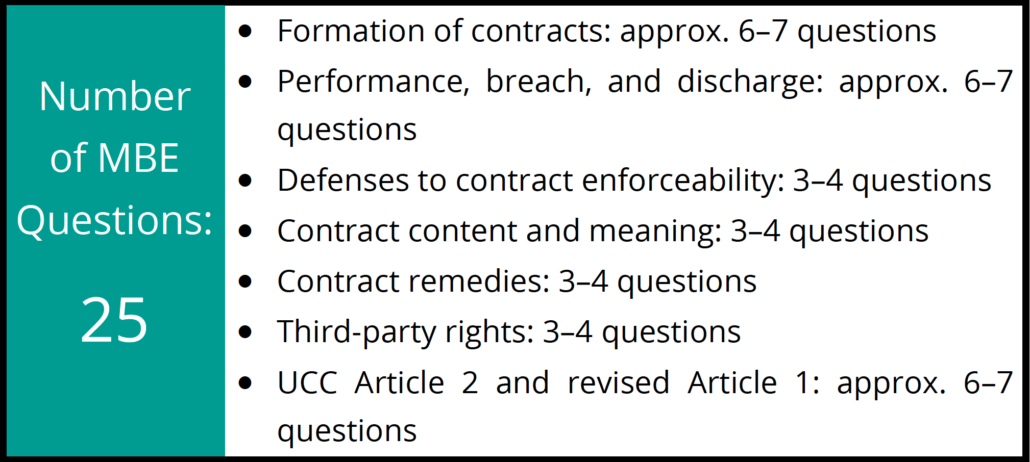
1. Introduction
Article 2 applies to the sale of goods. Common law applies to services and everything else.
2. Contract Formation
A contract has three elements: offer + acceptance + consideration.
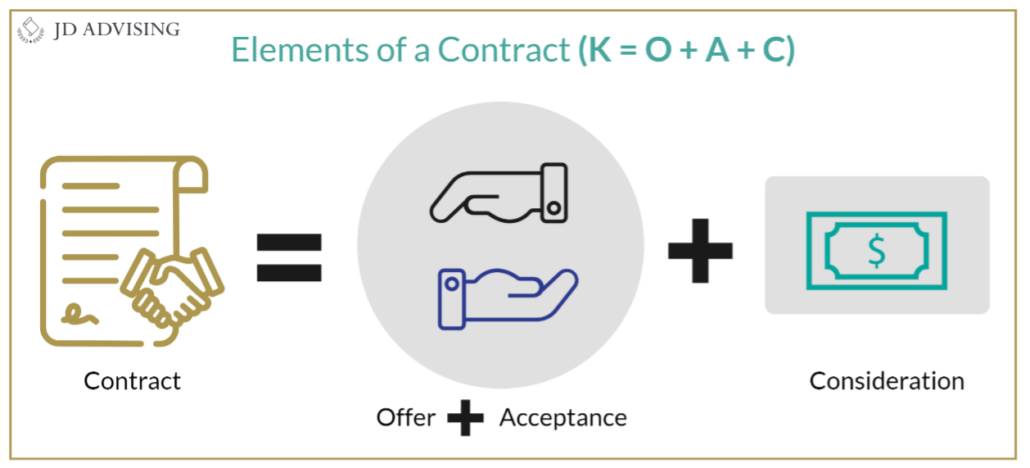
- Offer
- Creation of an offer
- You need intent to enter into a contract + specific terms (price, quantity, parties).
- An offer must be communicated to be accepted.
- Creation of an offer
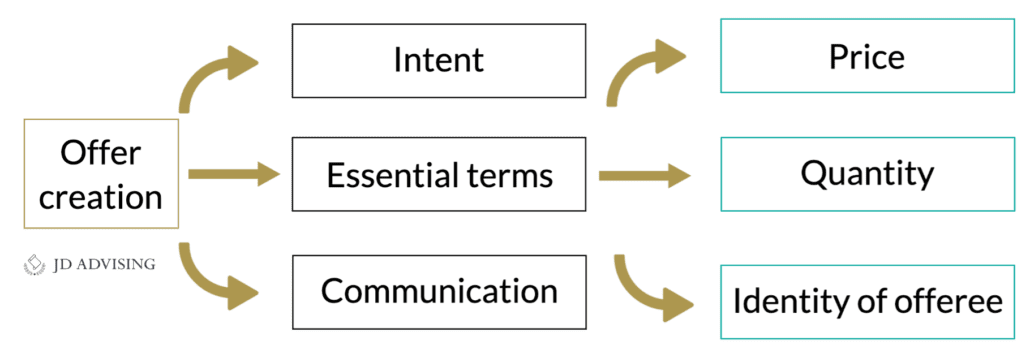
-
- Termination of an offer: There are four ways to terminate an offer:
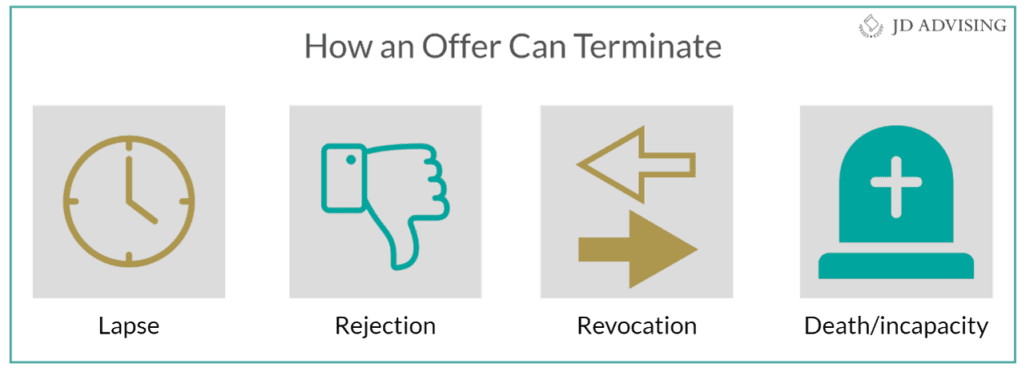
-
-
- Lapse of time: an offer lapses after a reasonable time.
- Rejection (including a counteroffer)
- Revocation of an offer: An offer can be revoked before acceptance unless it is FOUR:
- Firm offer (by a merchant in a signed writing under Article 2)
- Option contract (promise + consideration)
- Unilateral contract (beginning performance on a unilateral contract)
- Reasonably foreseeable substantial reliance on the offer
- Death or incapacity of offeror
-
- Acceptance
- Look at type of contract
- Bilateral contracts (most contracts) are accepted by promise or beginning performance.
- Unilateral contracts (rewards, prize, or offers that specify they are unilateral) can only be accepted by full performance.
- Look at type of contract
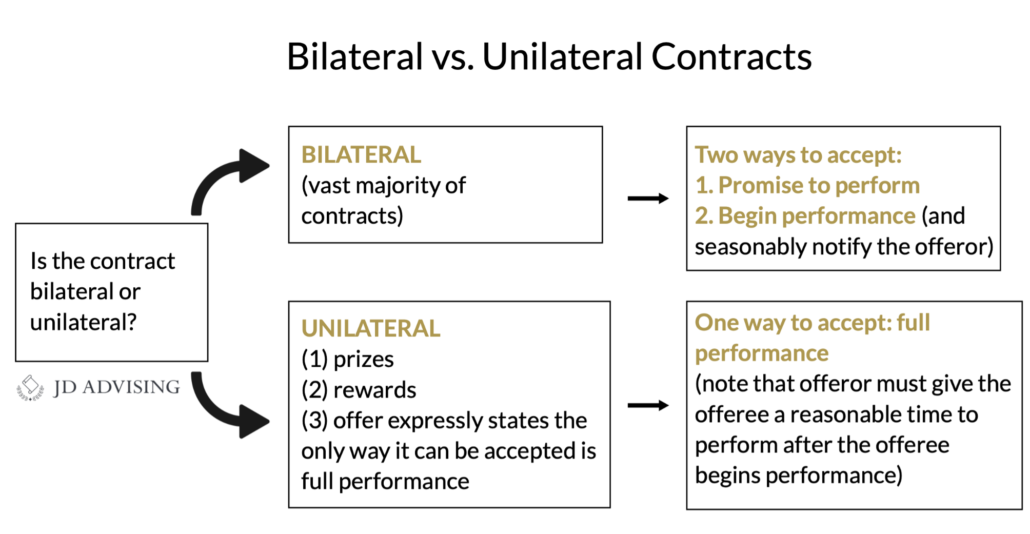
-
-
- Article 2—an offer for goods can be accepted by promising to ship, or shipping goods.
-
-
- When acceptance is effective
- Generally, acceptance is effective when sent (mailbox rule). Exceptions:
- an option contract, or
- if a rejection then acceptance is mailed (the one received first controls).
- If an acceptance then rejection is mailed (the mailbox rule applies)
- Generally, acceptance is effective when sent (mailbox rule). Exceptions:
- When acceptance is effective
-
- Terms of acceptance
- Common law: acceptance must be mirror image of offer or it is not an acceptance (it is a counteroffer).
- Terms of acceptance
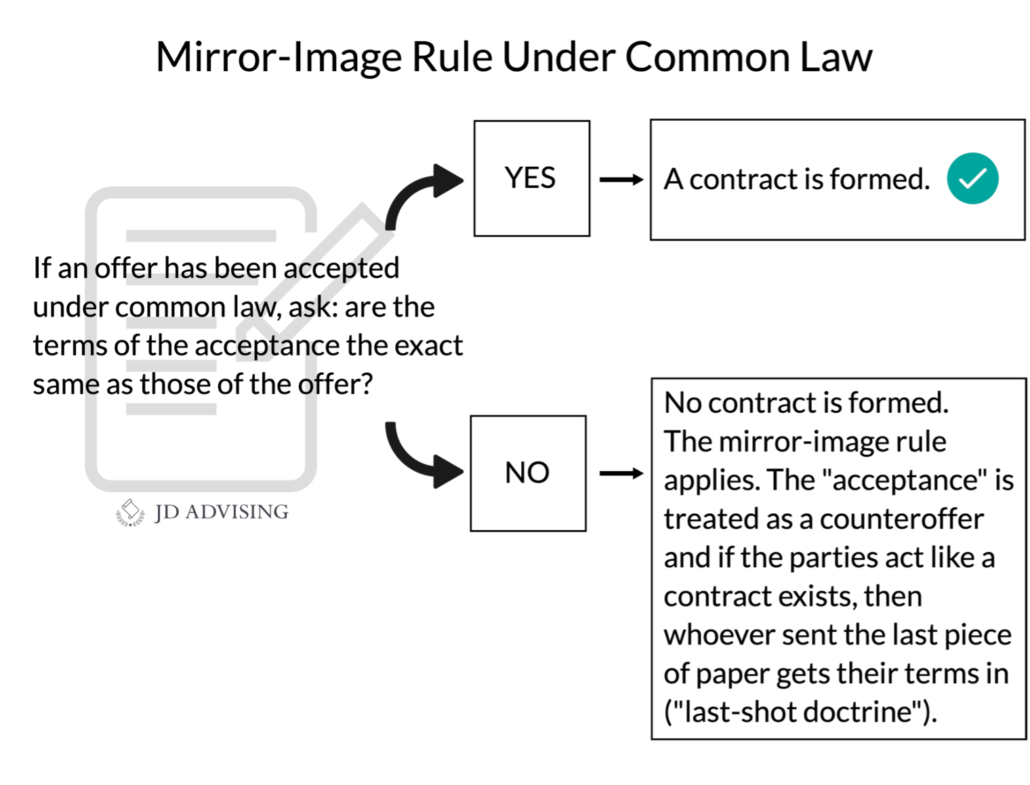
-
-
- UCC: Acceptance does not need to mirror the offer. An acceptance may have an additional or different term (UCC 2-207). Between merchants, the additional term will be a part of the contract unless it materially alters it, the offeror objects within a reasonable time, or the offer limits acceptance to the terms of the offer.
-
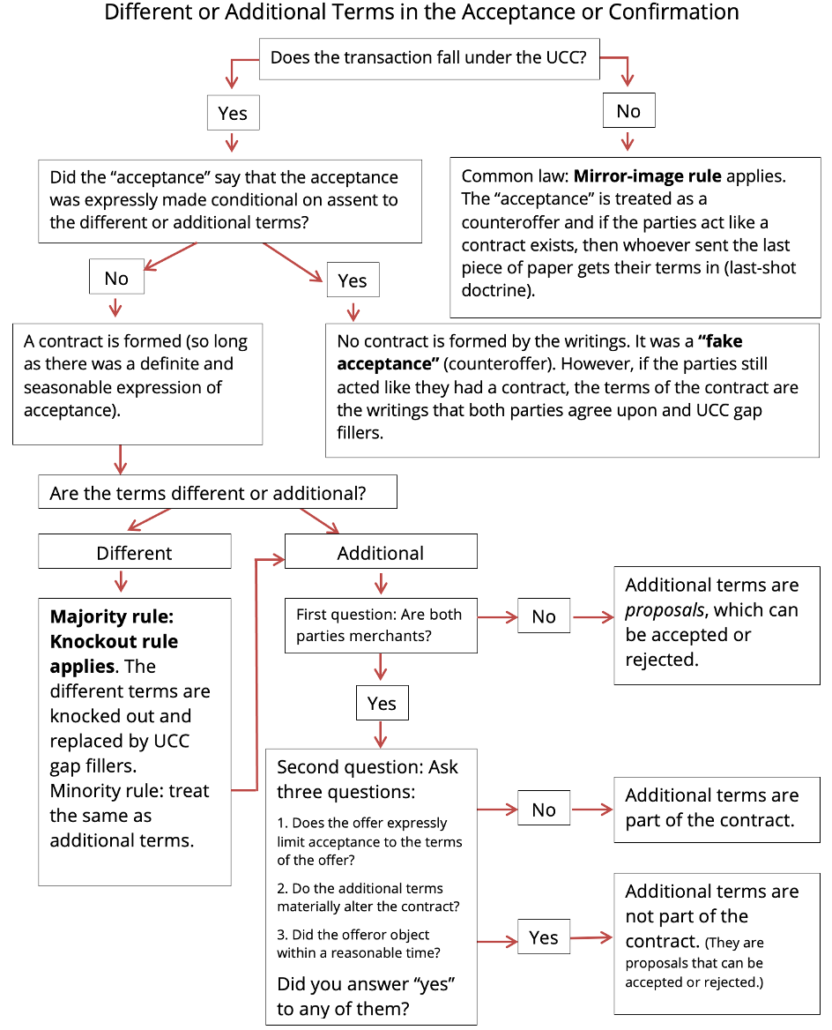
- Consideration
- “Bargained-for exchange”
- Things that do not constitute consideration: a promise to make a gift, past consideration, moral obligation, and illusory promise.

-
- Modifications
- Common law: there needs to be consideration to modify a contract (preexisting legal duty rule), unless there is a lawsuit settlement/release, unforeseen difficulty, preexisting duty to a third person, a written promise to pay a debt barred by the statute of limitations, or a payment in full/good faith dispute of a debt.
- UCC: Only good faith is needed. One does not need consideration to modify a contract.
- Modifications
3. Contract Interpretation
- General rule: Express terms control. Then courts look to course of performance, course of dealing, and trade usage.
- Keeping terms out: the parol evidence rule
- Applies when one wants to add a term from preliminary negotiations to a final written agreement.
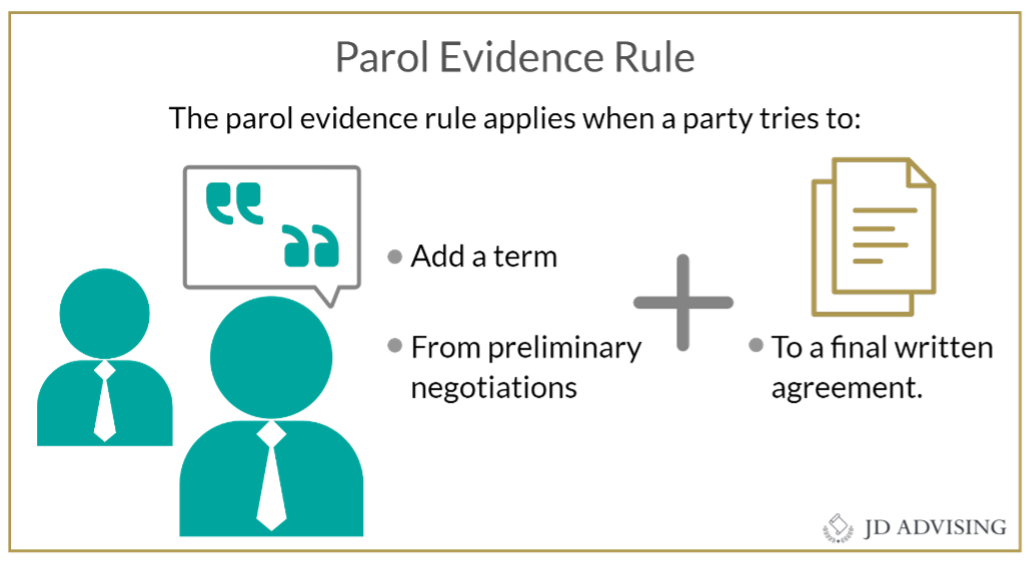
-
- If there is a complete integration (usually a merger clause), nothing comes in.
- If there is a partial integration, consistent additional terms are allowed in.
- The parol evidence rule does not apply to FICCL: formation defenses, interpretation of a contract term, failure of a condition precedent, clerical errors or a later modification.
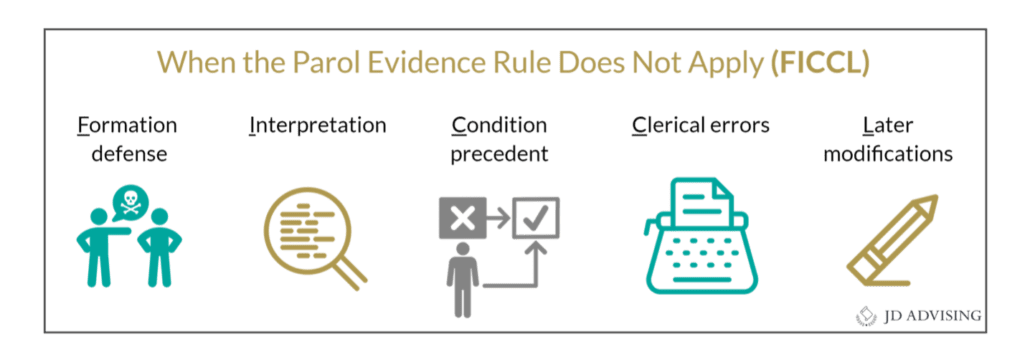
- Warranties
- Express warranties (affirmation of fact or a sample) cannot be disclaimed.
- Implied warranty of merchantability is made by a merchant that goods are fit for their ordinary purpose. It can be disclaimed.
- Implied warranty of fitness for a particular purpose can be made by any seller who knows of the buyer’s specific purpose. It can be disclaimed.
4. Performance obligations
- Common law: one has to substantially perform one’s duties in order for the other person’s duty (usually a duty to pay) to arise.
- Exception: Express condition (e.g., “I will buy it if I like it” or “I will buy it if I can get a 10% interest rate.”). An express condition needs to be complied with exactly.
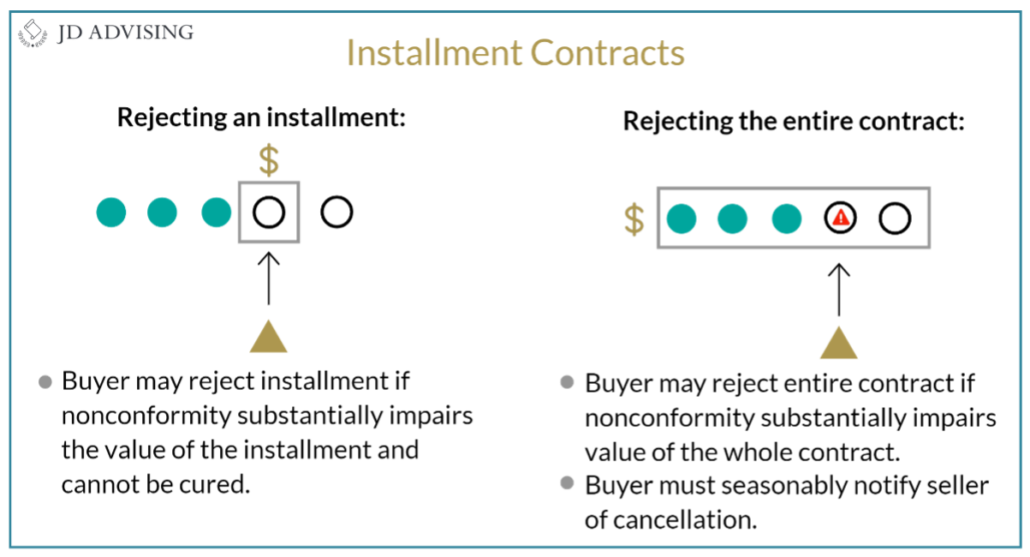
- UCC: the seller has to provide perfect tender of the goods (or the buyer can reject the goods).
- Exception: Installment contract. The buyer cannot reject unless there is a “substantial impairment,” and even then, the seller may cure.
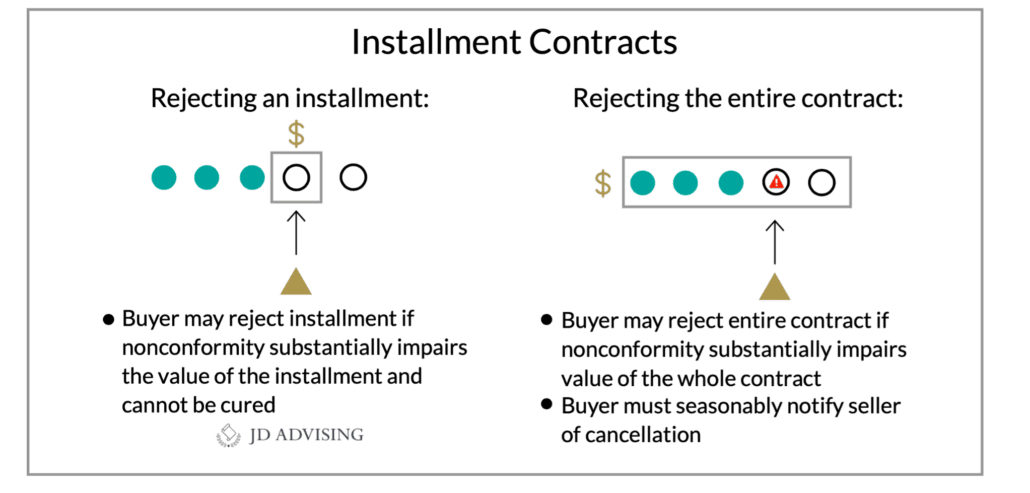
-
- A buyer may accept or reject nonconforming goods. If he accepts goods, he may later revoke his acceptance, but revocation is a higher standard than rejection.
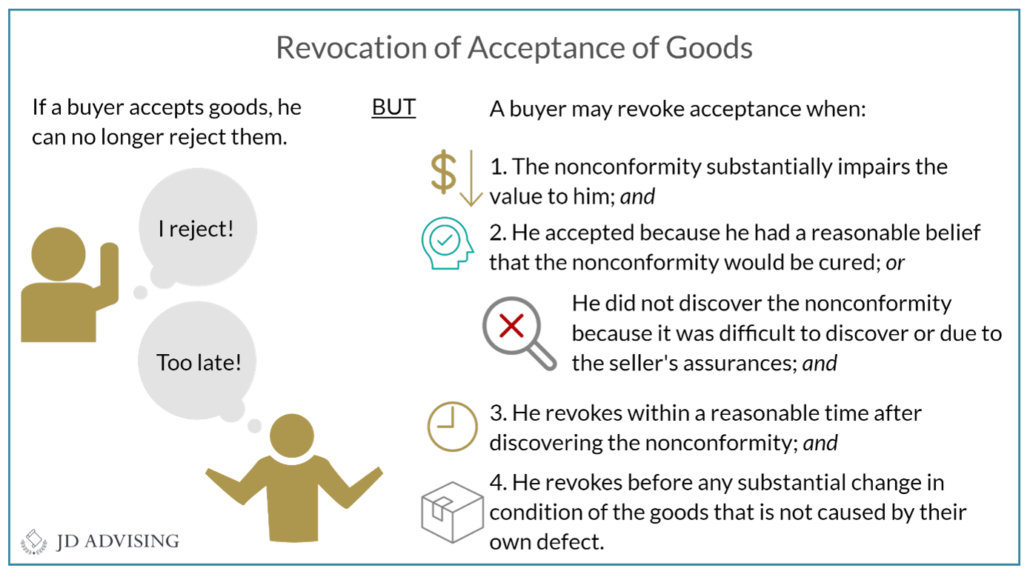
- Delivery obligations
- Carrier cases: Most are shipment contracts, and the seller only has to get the goods to the “shipper” and the risk of loss (ROL) passes to the buyer. For destination contracts (limited to when the contract says “FOB Buyer’s Place of Business” or “Ex-Ship”), the seller has to get it to the destination.
- Excusing conditions
- If the other party breaches (i.e., an anticipatory repudiation vs. a prospective inability to perform)
- Waiver of condition
- Discharging duties
- Performance
- Occurrence of a condition subsequent
- Agreement (novation, modification, accord and satisfaction, rescission, release)
- Changed circumstances so it becomes impossible or the purpose is frustrated
5. Defenses
- The Statute of Frauds (SoF)
- Satisfaction of SoF: you need a writing signed by the defendant that evidences a contract.
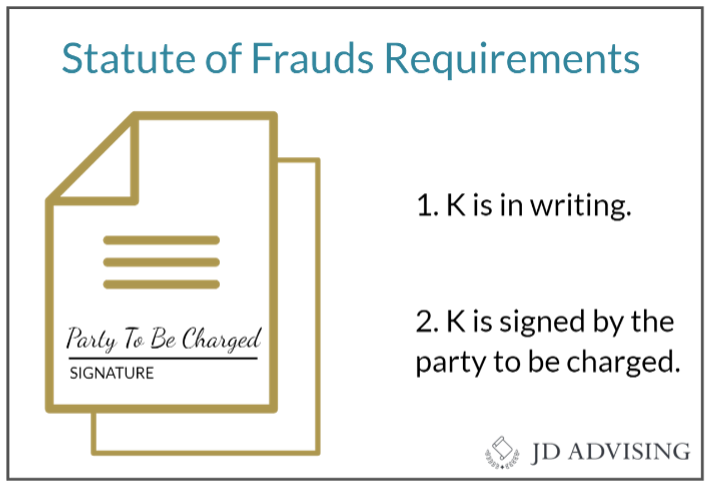
-
- Which contracts fall into SOF? (mnemonic = MYLEGS)
- Marriage, contracts for over a year, land, executor, sale of goods over $500, surety
- Which contracts fall into SOF? (mnemonic = MYLEGS)
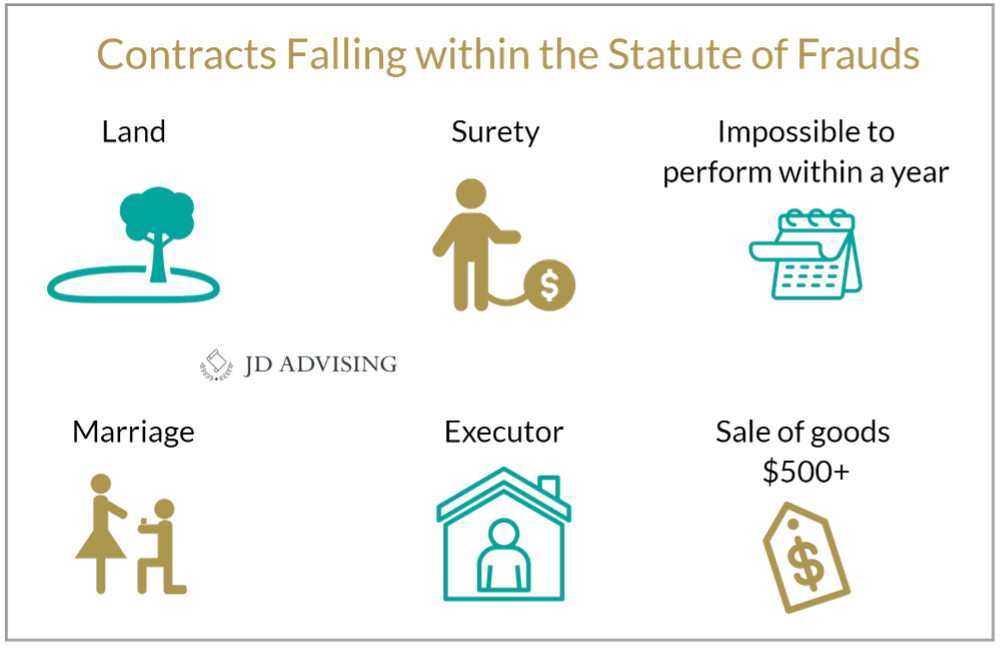
-
-
- Exceptions
- Land: part performance (two of the following three: moving in, paying a substantial amount of the purchase price, or improving the land a significant amount).
- Sale of goods (mnemonic = MAPS)
- Exceptions
-
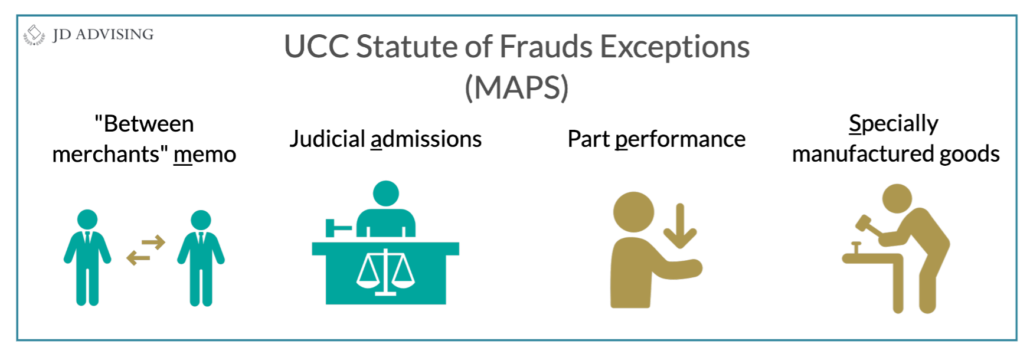
-
-
-
-
- Confirmatory memo between merchants: if one sends another a writing signed by him within a reasonable time showing there is a contract and the other fails to object in writing to the contents of the writing within 10 days of receipt.
- Judicial admissions: if one admits a contract in a pleading or testimony.
- Part performance: if one pays for or accepts a part of a contract, it is enforceable up to that amount.
- Specially manufactured goods: goods that are specially manufactured for the buyer and not suitable for sale to others in the seller’s ordinary course of business and the seller has made a substantial beginning, then the entire contract is enforceable.
-
-
-
- Capacity
- Legal incapacity for minors, mentally incompetent persons, or intoxicated persons.


-
- Duress: This is a high bar. The contract is voidable.
- Undue influence: Unfair persuasion from a person in a position of trust, confidence, or dominance. The contract is voidable.
- Lack of contract formation
- Mutual mistake: if both parties are mistaken about a basic assumption of fact that materially affects the agreed upon exchange and neither bears the risk, the contract is voidable.
- Unilateral mistake: if one party is mistaken and the other person knew or had reason to know, then the contract is voidable.
- Mutual misunderstanding: if both parties have a different understanding of a material term that is open to at least two reasonable interpretations and neither party has any reason to know the meaning attached by the other— no contract.
- Fraud, misrepresentation, or nondisclosure
- Illegality or public policy
6. Remedies
- General rule: you get expectation damages.

- Incidental damages are those related to avoiding the loss from the breach.
- Consequential damages are those that are foreseen at the time the contract is entered into.
- Mitigation of damages is required.
- UCC formulas
- Seller breaches and buyer has goods: buyer gets the value of the goods as contracted for – the value of the goods as delivered + incidentals and consequentials.
- Seller breaches and seller has goods: buyer gets the difference between the market price (or replacement price) and contract price + incidentals and consequentials – expenses saved.
- Buyer breaches and buyer has goods: seller gets the contract price.
- Buyer breaches and seller has the goods: seller gets the difference between the contract price and market price (or resale price) + incidentals – expenses saved.
- Lost volume seller: seller gets lost profits plus incidentals.
- Specific performance is not usually available unless the goods are unique or if it is a land contract.
- Liquidated damages are enforceable if they are difficult to estimate at the time of contract and a reasonable forecast of damages.
Damages summary chart
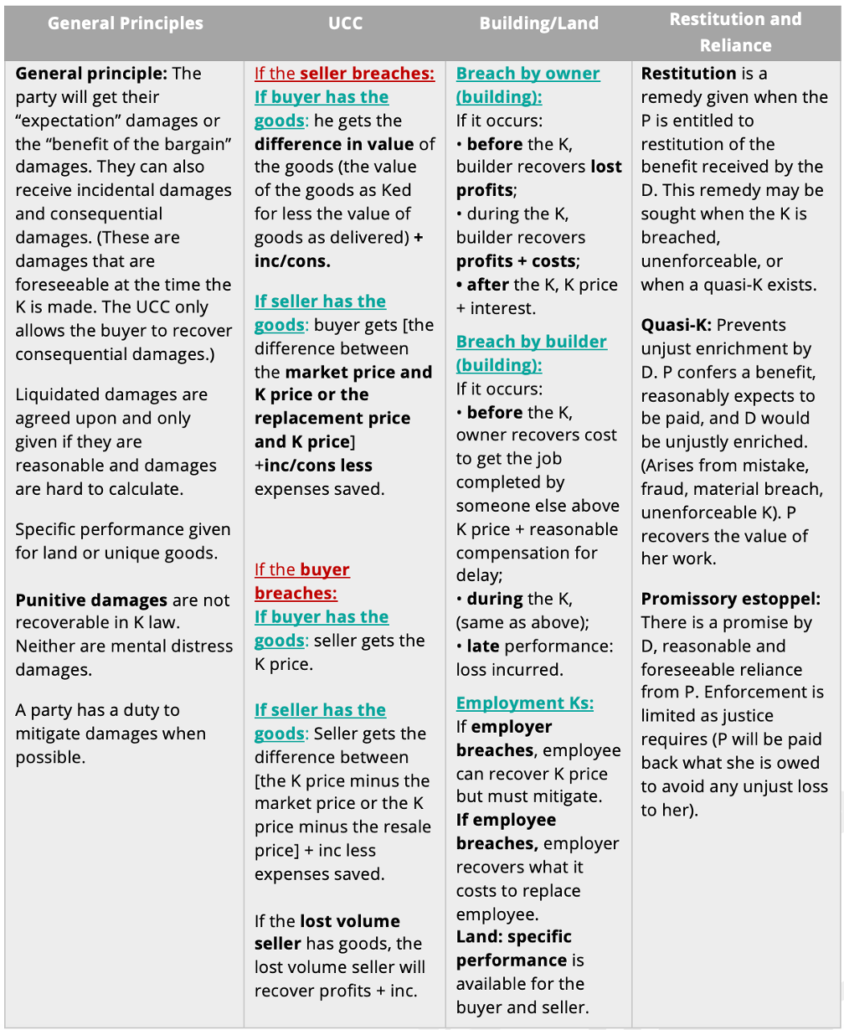
7. Third-party rights
- Third parties
- Intended third-party beneficiaries have rights under a contract assuming their rights vest.
- Is the third-party beneficiary (TPB) intended or incidental? Look at four factors:
- Is the TPB expressly designated in the contract?
- Is performance directly to the TPB?
- Does the TPB have any rights under the contract?
- What is the relationship between the TPB and the promisee?
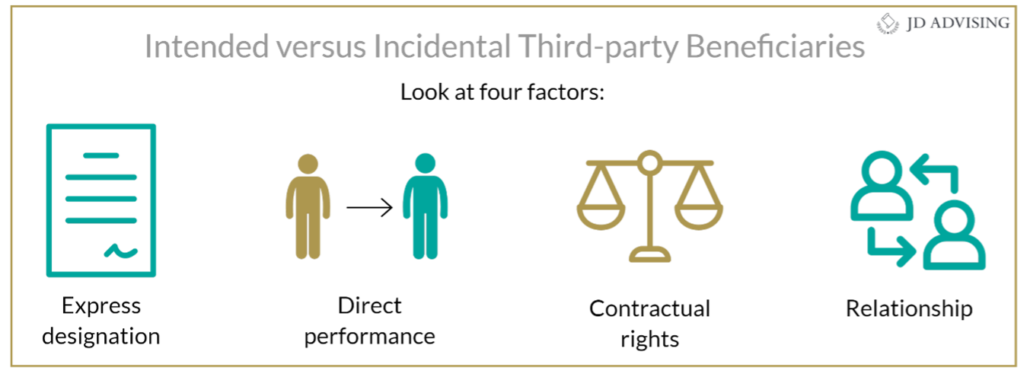
-
- Incidental third-party beneficiaries do not have rights under a contract.
- Delegation
- One can generally delegate a contract unless the contract prohibits it (by saying “no delegation” or “no assignments”) or if the contract involves skill, judgment, or trust.
- You do not need consent, consideration, or a writing to delegate duties.
- The delegator is always liable. The delegatee is liable if consideration was paid.
- Assignment
- Generally, rights can be assigned unless the assignment substantially changes the obligor’s duties or the contract prohibits it.
- An assignment may be revoked if there was no consideration for it. An assignor may not revoke an assignment if there is consideration or if it is payment for a preexisting debt.
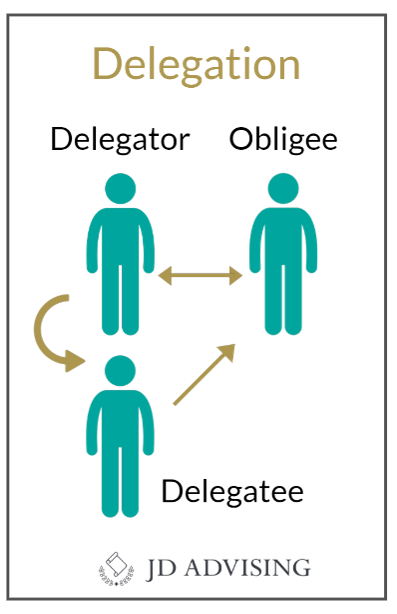
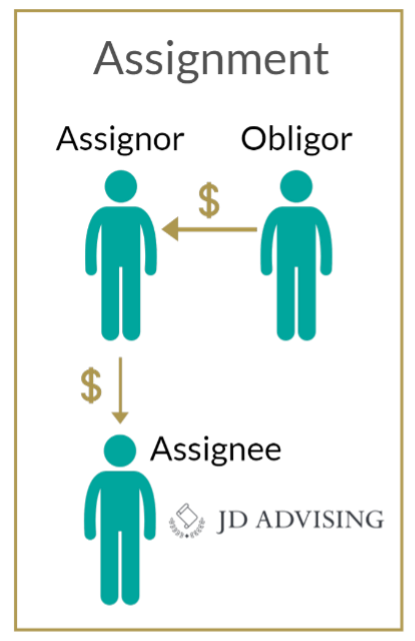
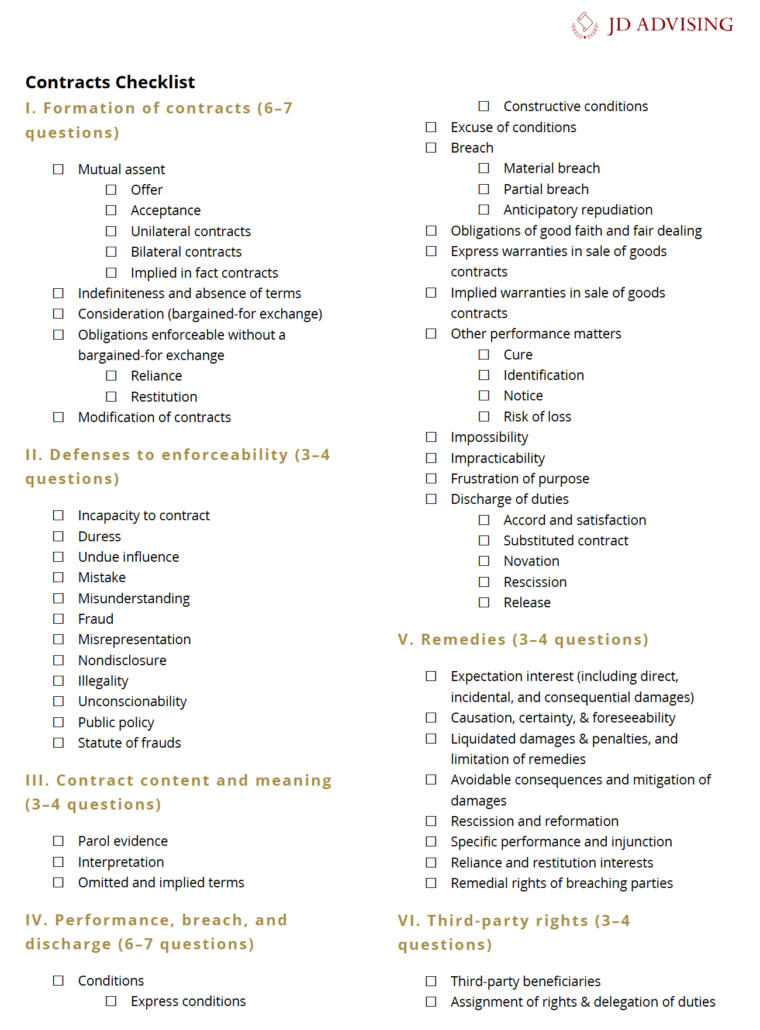 Go to the next topic, Criminal Law and Procedure—Highly Tested MBE Topics, Charts, and a Checklist!
Go to the next topic, Criminal Law and Procedure—Highly Tested MBE Topics, Charts, and a Checklist!
Seeking MBE Assistance?
Seeking MBE Assistance?
- 📘 MBE Guide: Equip yourself with our FREE expert-crafted bar exam and MBE guides.
- Free Bar Exam Resource Center: Discover top resources, articles, and free webinars led by renowned bar exam professionals.
Top Resources as Vouched by our Students:
- MBE One-Sheets: One of our most highly acclaimed bar exam supplements!
- Bar Exam Outlines: Our comprehensive and condensed bar exam outlines present key information in an organized, easy-to-digest layout.
- MBE Private Tutoring: Opt for personalized, effective strategies.
- On Demand Bar Exam Course: Comprehensive bar exam preparation.
- Bar Exam Crash Course and Mini Outlines: Acclaimed and effective for a quick refresher.
- MBE Mastery Class, Real MBE Questions, and MBE Guide: Elevate your MBE preparation with these high-quality MBE supplements!
🔥 NEW! Check out our Repeat Taker Bar Exam Course and get introduced to our unmatched platinum Guarantee Pass Program.

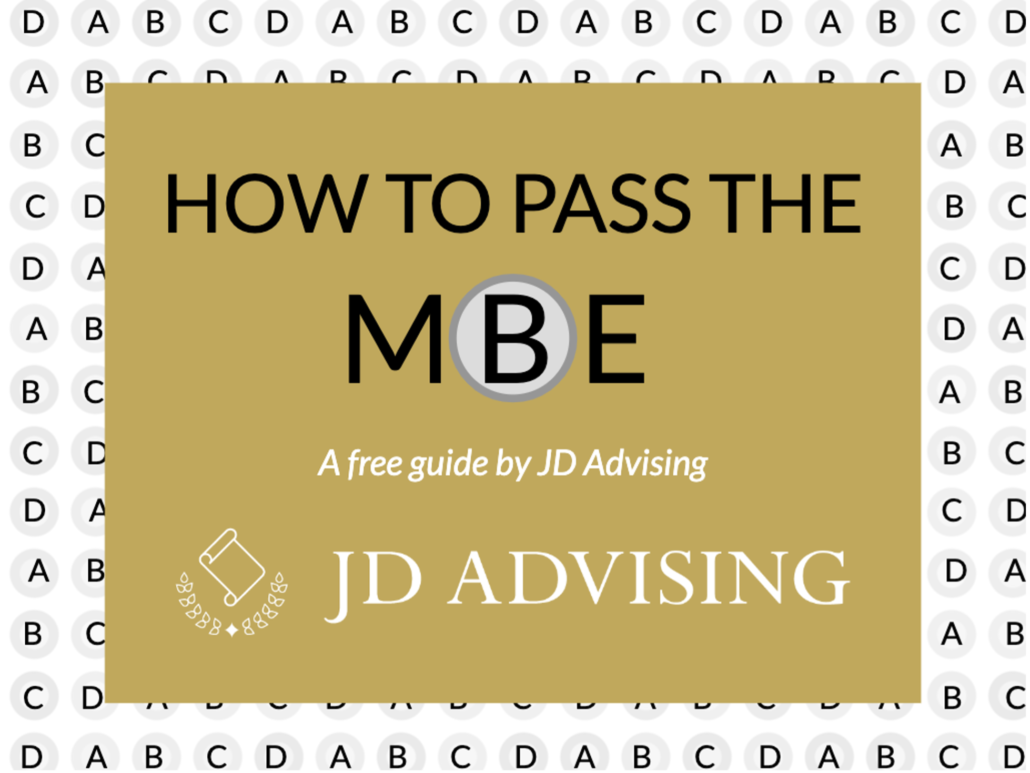
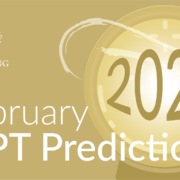



Leave a Reply
Want to join the discussion?Feel free to contribute!